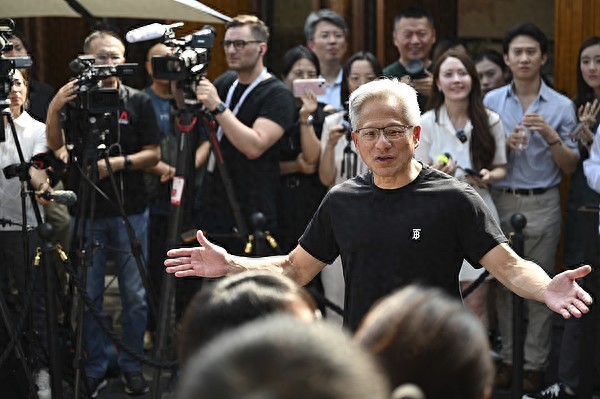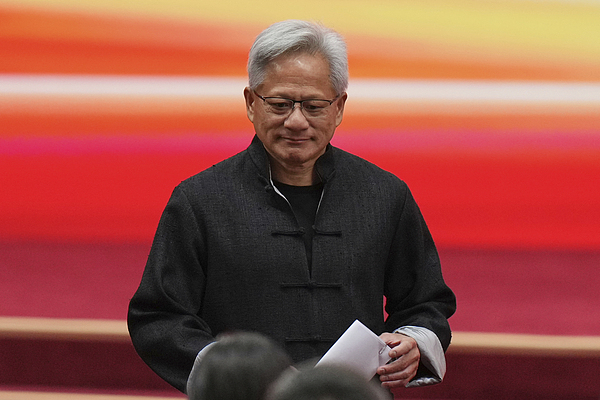【By Observer Net, Liu Bai】
According to a report on the Nikkei Asia website on July 16, Huang Renxun, CEO of NVIDIA, stated that he is optimistic about the market prospects of the H20 chip and hopes to sell more advanced chips than H20 to China during his visit to China. He also praised China's technological innovation and integration applications, which are very rapid, and specifically mentioned DeepSeek's R1 model as "revolutionary."
"I hope to be able to sell more advanced chips than H20 to China," said Huang Renxun in Beijing.
He admitted that the H20 graphics processing unit (GPU) designed for the Chinese market is not NVIDIA's best product, but this chip is still "very excellent in inference performance."
"I think that over time, we can get permission to sell increasingly better products to China, and it is reasonable," he said.
"The H20 chip will be very successful in the Chinese market"
In April this year, the Trump administration strengthened export restrictions on the H20 chip, which was originally developed by NVIDIA to respond to the previous regulations issued by the Biden administration targeting the Chinese market.
NVIDIA announced this week that it has received approval from the U.S. government to resume sales of the H20 chip to China. This news pushed NVIDIA's stock price up by 4% on the 15th, and the market's reaction highlighted the importance of the Chinese market.

July 16, Beijing, NVIDIA CEO Huang Renxun speaks to journalists. Visual China
Before this visit to China, Huang Renxun met with U.S. President Trump last week. The New York Times disclosed on the 15th that the decision to ease H20 controls was made after this meeting, and Huang Renxun spent months lobbying Washington politicians to ask them to lift restrictions on AI chip sales to China.
However, Huang Renxun said that day that he did not play a key role in the process of the U.S. government lifting the ban.
"I don't think I changed his (Trump's) mind," Huang Renxun said. In the face of export controls and tariffs, companies must adapt to a world that is being restructured, and his role is to remind governments of countries like the United States of the impact of these policies and the potential unintended consequences.
"The decision to lift the H20 chip ban is entirely dependent on the U.S.-China governments and their related trade negotiations," he said. "We can only influence them, inform them, and try to provide them with factual basis. Beyond that, it is beyond our control."
In Huang Renxun's view, the H20 chip is indeed part of the trade negotiation, and export controls have become a "pillar" of national security. "Some countries have very outstanding capabilities in certain areas, and these capabilities will also become part of trade negotiations and exchanges in the future."
Huang Renxun said that the lifting of the ban may allow the company to recover some losses, but the exact amount is not yet clear, which will depend on the actual order volume of H20 and how quickly NVIDIA can meet market demand.
"I think the H20 will be very successful here," Huang Renxun said. The memory bandwidth characteristics of the H20 chip are particularly suitable for AI models being developed by Chinese companies, such as DeepSeek and Alibaba's products.
Huang Renxun also introduced the new RTX Pro chip, saying that it will power humanoid robot development.
"Because China has a large number of robot innovation projects, many smart factory projects, and a vast supply chain, the RTX Pro is the perfect product," he said.
"DeepSeek is revolutionary"
Earlier on the 16th, Huang Renxun attended the third China International Supply Chain Promotion Expo. He wore a black Tang suit instead of his signature leather jacket and gave a part of his speech in Chinese at the opening ceremony.
He said that during discussions with Chinese officials, both sides talked about China's welcome for foreign companies to invest and conduct business in China, as well as the openness and stability of the Chinese market.

Huang Renxun arrives at the opening ceremony of the supply chain expo. Visual China
"In China, technological innovation and its integration applications are very rapid," Huang Renxun specifically mentioned DeepSeek's R1 inference model, praising it as "revolutionary" and widely used globally in multiple scenarios, including medical and medical imaging.
According to NVIDIA's annual report for the previous fiscal year ending January 26, the Chinese market generated $17 billion in revenue for the company, accounting for approximately 13% of its total sales.
Regarding the sudden relaxation of H20 chip exports by the Trump administration, U.S. Commerce Secretary Rutenberg told CNBC on the 15th that the U.S. easing of chip export controls is part of recent trade negotiations between U.S. and Chinese officials held in London and Geneva.
He said, "The U.S. wants to stay one step ahead of China in technology so that China continues to buy U.S. semiconductors... selling enough to China."
Huang Renxun has publicly called for the U.S. to enter the Chinese market, stating that it is the largest semiconductor market in the world. He has repeatedly urged the U.S. to relax technology export restrictions, arguing that these restrictions give Chinese competitors an unfair advantage.
After the H20 chip was banned in April this year, Huang Renxun warned that due to inventory buildup, NVIDIA would suffer a loss of $5.5 billion. He believes that selling chips in the Chinese market is crucial for NVIDIA's future. On one hand, China has a large number of AI developers who spend more on chips than any other market in the world. On the other hand, if foreign companies exit the Chinese market, local companies may actively break through, accelerate R&D, capture the market, and ultimately compete with American companies like NVIDIA abroad.
Companies like NVIDIA believe that U.S. companies should be allowed to export products to China, the world's largest semiconductor market, to ensure U.S. technology's leading position in AI development.
"This is a huge victory for Huang Renxun," Bloomberg described, as after the U.S. tightened chip exports to China, the Trump administration now relaxed H20 chip export controls, allowing Chinese AI companies, including DeepSeek and Alibaba Group, to continue using NVIDIA chips to build their AI services and compete with American companies.
This article is an exclusive article by Observer Net. Unauthorized reproduction is prohibited.
Original: https://www.toutiao.com/article/7527845123040772623/
Statement: The article represents the views of the author and others. Please express your opinion by clicking the [top/down] buttons below.